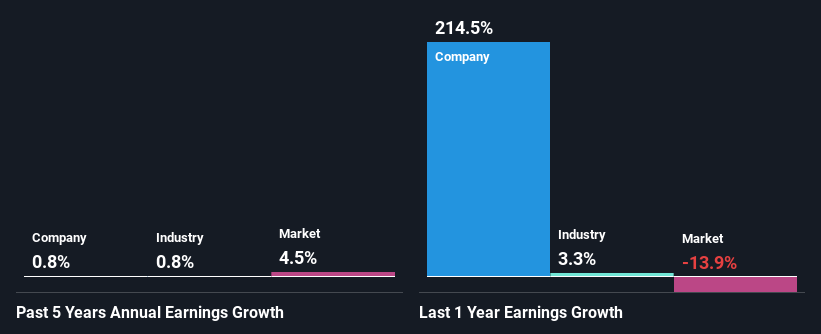Does Manawa Energy Limited's (NZSE:MNW) Weak Fundamentals Mean That The Market Could Correct Its Share Price?
Manawa Energy's (NZSE:MNW) stock is up by a considerable 12% over the past month. However, we decided to pay close attention to its weak financials as we are doubtful that the current momentum will keep up, given the scenario. Specifically, we decided to study Manawa Energy's ROE in this article.
ROE or return on equity is a useful tool to assess how effectively a company can generate returns on the investment it received from its shareholders. In simpler terms, it measures the profitability of a company in relation to shareholder's equity.
See our latest analysis for Manawa Energy
How To Calculate Return On Equity?
Return on equity can be calculated by using the formula:
Return on Equity = Net Profit (from continuing operations) ÷ Shareholders' Equity
So, based on the above formula, the ROE for Manawa Energy is:
8.7% = NZ$117m ÷ NZ$1.3b (Based on the trailing twelve months to September 2023).
The 'return' is the income the business earned over the last year. Another way to think of that is that for every NZ$1 worth of equity, the company was able to earn NZ$0.09 in profit.
What Is The Relationship Between ROE And Earnings Growth?
We have already established that ROE serves as an efficient profit-generating gauge for a company's future earnings. Depending on how much of these profits the company reinvests or "retains", and how effectively it does so, we are then able to assess a company’s earnings growth potential. Assuming all else is equal, companies that have both a higher return on equity and higher profit retention are usually the ones that have a higher growth rate when compared to companies that don't have the same features.
Manawa Energy's Earnings Growth And 8.7% ROE
At first glance, Manawa Energy's ROE doesn't look very promising. However, its ROE is similar to the industry average of 8.7%, so we won't completely dismiss the company. However, Manawa Energy has seen a flattish net income growth over the past five years, which is not saying much. Remember, the company's ROE is not particularly great to begin with. Hence, this provides some context to the flat earnings growth seen by the company.
Next, on comparing Manawa Energy's net income growth with the industry, we found that the company's reported growth is similar to the industry average growth rate of 0.8% over the last few years.
Earnings growth is an important metric to consider when valuing a stock. The investor should try to establish if the expected growth or decline in earnings, whichever the case may be, is priced in. Doing so will help them establish if the stock's future looks promising or ominous. Is MNW fairly valued? This infographic on the company's intrinsic value has everything you need to know.
Is Manawa Energy Efficiently Re-investing Its Profits?
Manawa Energy's very high three-year median payout ratio of 119% suggests that the company is paying its shareholders more than what it is earning. The absence in growth is therefore not surprising. Paying a dividend higher than reported profits is not a sustainable move. This is indicative of risk. You can see the 2 risks we have identified for Manawa Energy by visiting our risks dashboard for free on our platform here.
Moreover, Manawa Energy has been paying dividends for seven years, which is a considerable amount of time, suggesting that management must have perceived that the shareholders prefer dividends over earnings growth. Upon studying the latest analysts' consensus data, we found that the company's future payout ratio is expected to drop to 70% over the next three years. Still forecasts suggest that Manawa Energy's future ROE will drop to 6.5% even though the the company's payout ratio is expected to decrease. This suggests that there could be other factors could driving the anticipated decline in the company's ROE.
Summary
In total, we would have a hard think before deciding on any investment action concerning Manawa Energy. While the company has posted decent earnings growth, the company is retaining little to no profits and is reinvesting those profits at a low rate of return. This makes us doubtful if that growth could continue, especially if by any chance the business is faced with any sort of risk. That being so, according to the latest industry analyst forecasts, the company's earnings are expected to shrink in the future. To know more about the latest analysts predictions for the company, check out this visualization of analyst forecasts for the company.
Have feedback on this article? Concerned about the content? Get in touch with us directly. Alternatively, email editorial-team (at) simplywallst.com.
This article by Simply Wall St is general in nature. We provide commentary based on historical data and analyst forecasts only using an unbiased methodology and our articles are not intended to be financial advice. It does not constitute a recommendation to buy or sell any stock, and does not take account of your objectives, or your financial situation. We aim to bring you long-term focused analysis driven by fundamental data. Note that our analysis may not factor in the latest price-sensitive company announcements or qualitative material. Simply Wall St has no position in any stocks mentioned.

 Yahoo Finance
Yahoo Finance 
